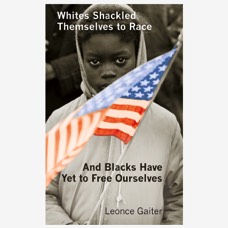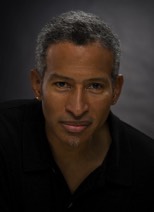
Author Leonce Gaiter on the new book, Whites Shackled Themselves to Race and Blacks Have Yet to Free Ourselves.
"Whites Shackled Themselves to Race and Blacks Have Yet to Free Ourselves" describes how Afro-Americans can shed the “race” shackles the majority clamped on us all those centuries ago. The goal was our exclusion from the family of men. The goal was our subjugation and enslavement. To achieve those aims, the definition of the 'black race' became no more than negative stereotypes tied to skin color—and we've been living under it, or reacting to it ever since. Whites Shackled Themselves to Race… discusses how to redefine ourselves as the vital American cultural force that we have become, instead of the racial caste we were branded. It insists that we use that elevated self-image to teach ourselves to live and thrive in the often-racist America we have, as opposed to the colorblind utopia to which some pay lip service.
Excerpts
[Click anywhere on first paragraph to expand, and click again to collapse]
Definitions:
African-American - Any American citizen of black African ancestry. He or she could be descended from slaves who were brought here in 1700, or they could be Cuban or Ghanaian immigrants who were naturalized yesterday. [Read more]
African-American - Any American citizen of black African ancestry. He or she could be descended from slaves who were brought here in 1700, or they could be Cuban or Ghanaian immigrants who were naturalized yesterday. [Read more]
African-Americans hail from many different countries and regions, and thus may have few, if any, cultural similarities—no more than a recent white German immigrant would have with an 4th generation white American of Italian ancestry… Color is not culture, white or black.
Black - Used interchangeably and synonymous with “African-American.”
Afro-American - Denotes the distinct culture of the American descendants of African slaves. This is America’s predominant African-American culture, and the one we often mean to invoke when we use the far less specific terms “black” and “African-American.”
Many of the issues that impact Afro-Americans also impact African-Americans more generally. Americans have never been surgical about our race hatred. Historically, black skin alone has been enough to trigger it. However, Afro-Americans bear the cultural l legacy of American’s great crime—slavery and the subsequent 100-plus years of both legal and socially accepted apartheid and second-class citizenship, seasoned with terror, violence and lack of access to educational, political, and financial opportunities that white Americans considered their birthright.
Black - Used interchangeably and synonymous with “African-American.”
Afro-American - Denotes the distinct culture of the American descendants of African slaves. This is America’s predominant African-American culture, and the one we often mean to invoke when we use the far less specific terms “black” and “African-American.”
Many of the issues that impact Afro-Americans also impact African-Americans more generally. Americans have never been surgical about our race hatred. Historically, black skin alone has been enough to trigger it. However, Afro-Americans bear the cultural l legacy of American’s great crime—slavery and the subsequent 100-plus years of both legal and socially accepted apartheid and second-class citizenship, seasoned with terror, violence and lack of access to educational, political, and financial opportunities that white Americans considered their birthright.
To Culturally Unify DuBois's "Double Consciousness":
To provide an expansive vision of Afro-America that allows us to better thrive in this country, we must color outside the lines of the racial classification to which we've adhered throughout our history—even within triumphant moments like the Civil Rights Movement. [More]
To provide an expansive vision of Afro-America that allows us to better thrive in this country, we must color outside the lines of the racial classification to which we've adhered throughout our history—even within triumphant moments like the Civil Rights Movement. [More]
It demands that we move past merely rejecting racist views born of that classification and shatter the classification itself, thereby sanctioning our possession of everything this country hash too offer instead of complying with the notion that most of it is "theirs"—that they hold a more central place in its history and formation than we—that they can have a right to more of its fruits than we.
I want to reclaim Afro-American history and its attendant culture for Afro-Americans, outside the confines of the bargain basement bin in which American history relegates "black history." I want choices clearly available outside of mimicking or accepting mainstream racist myths or a lifetime of reacting to them. I want to destroy in the black mind the notion of "whiteness" outside an overtly racist context and thus upon the entirety of this nation, its history and culture, to Afro-American exploitation—because all of it is ours. By shedding reliance on the racist racial categories that have bound us with ropes made of the majority's self-imposed whiteness—and the bigotry the identity was created to foster—we can finally blind the contemptuous "eyes of others" of which the double consciousness speaks.
How white people invented the white race:
For the majority of this nation’s history, race has defined America. However, there was a time prior to this country’s founding when the “white race” did not exist on this soil. [More]
For the majority of this nation’s history, race has defined America. However, there was a time prior to this country’s founding when the “white race” did not exist on this soil. [More]
For his book, “The Invention of the White Race,” Theodore Allen scoured records from 17th century Virginia, where almost one in four bond laborers was of African origin. He found no use of the word “white” in official records until around 1680. Thus, from 1619 to around 1680, despite the presence of both black and white indentured laborers in Virginia, no one was officially categorized or described as “white.”
Only with the economic desire to degrade Africans to the role of property did the ‘white race’ become established. Slave owners had to define a permanent class of persons as so different from themselves that they did not deserve the right to own their own bodies, the fruits of their labors, or their own offspring…
Our enslavement so impacted this nation, was so central to its existence, that all of its majority soon adopted a ‘white’ racial identity to cement their full humanity. Only that identity ensured their access to freedom. For poor whites, that identity also provided something new and precious—a political, social and cultural tether to the landed wealthy—a connection that did not exist in class-based European societies, a connection that helped grow the American ideal of upward mobility.
Bias is the norm. We must prepare for it:
We have been waiting for our 50-year-old political triumphs to trickle down (or up) such that the majority acknowledges and battles flagrant injustice against us. In most instances, that has not happened. Whether the gross racial disparities catalogued herein are the result of race hatred or subconscious bias simply does not matter. What does matter is the effect on black lives. [More]
We have been waiting for our 50-year-old political triumphs to trickle down (or up) such that the majority acknowledges and battles flagrant injustice against us. In most instances, that has not happened. Whether the gross racial disparities catalogued herein are the result of race hatred or subconscious bias simply does not matter. What does matter is the effect on black lives. [More]
Psychologists Drs. Mahzarin R. Banaji and Anthony G. Greenwald of Harvard and University of Washington, respectively, are among the many researchers who have demonstrated the lie of “colorblindness” or the belief that prejudice is a rarity or an aberration. Banaji and Greenwald developed Implicit Association Tests (IAT) that reveal unconscious biases against various groups—blacks, women, etc. In the introduction to their book, “Blindspot: Hidden Biases of Good People,” the authors state:
“In this book we aim to make clear why many scientists, ourselves very much included, now recognize hidden-bias blindspots as fully believable because of the sheer weight of scientific evidence that demands this conclusion. But convincing readers of this is no simple challenge. How can we show the existence of something in our own minds of which we remain completely unaware.”
Culturally, Equal is Not Good Enough:
Knowing of … cultures that crowned themselves superior, and revisiting the Margo Monteith quote, “To the extent we can feel better about our group relative to other groups, we can feel good about ourselves,” I searched for instances in which Afro-Americans crowned ourselves culturally superior. I could not find any. [More]
Knowing of … cultures that crowned themselves superior, and revisiting the Margo Monteith quote, “To the extent we can feel better about our group relative to other groups, we can feel good about ourselves,” I searched for instances in which Afro-Americans crowned ourselves culturally superior. I could not find any. [More]
Yes, there are spheres we dominate, but do we instill the idea in young people that they come from a stock that is more courageous, more resolute than any other American people have had to be? Do we credit ourselves with our mercy and restraint (good or bad)? We certainly know that if anyone had done to white Americans what they have done to us, it would have been cause for nothing less than a genocidal rampage against the perpetrators. Do we credit ourselves with being a sufficiently formidable force that in 2011 most Americans assumed we represented 20% of the population instead of the 12% we comprised at the time? There is nary an aspect of this country’s governance that our presence has not inordinately influenced—from the structure of our governmental institutions to the rights and freedoms we profess to love. Do we credit ourselves as the people who forced this nation to recognize that it failed to practice what it preached regarding equality under the law, or with forcing this nation to legally enforce the concepts it claimed to hold dear, but had instead betrayed? Do we place ourselves front and center in America’s story?
Equality is a demotion. I do not feel we are equal to the white men and women with whom we share this land. I feel that we are superior. We have had to be. They have not clawed their way out of 188 years of various forms of legally and socially enforced bondage and subjugation to compel the offending nation to change it laws and its habits. They have not colored every aspect of this culture from music to dance to speech in the face of 188 years of non- and second-class citizenship. We have come farther. We have overcome more. Isn’t it time to develop an historical and cultural curriculum that teaches this to our children, that counters the negative lessons they’ll inevitably imbibe from the majority?

Leonce Gaiter's fiction includes the historical novel, "I Dreamt I Was in Heaven - The Rampage of the Rufus Buck Gang," the coming-of-age novel, "In the Company of Educated Men," and the noir thriller, "Bourbon Street."
His non-fiction has appeared in Newsweek, The Huffington Post, The Los Angeles Times, The Washington Post, The New York Times, in national syndication, and elsewhere.
Raised in a military family, Gaiter grew up in Louisiana, Germany, Missouri, Washington, D.C. and Maryland. After graduating from Harvard, he moved to Los Angeles and worked in the creative and business ends of the film and recording industries. He subsequently worked as marketing agency strategist and creative director for large technology accounts. He currently lives in Northern California. You can learn more about his work and read excerpts at leoncegaiter.com.